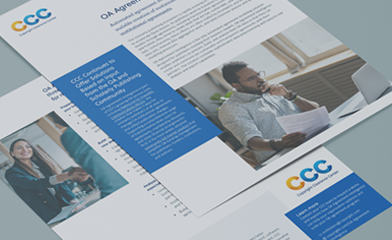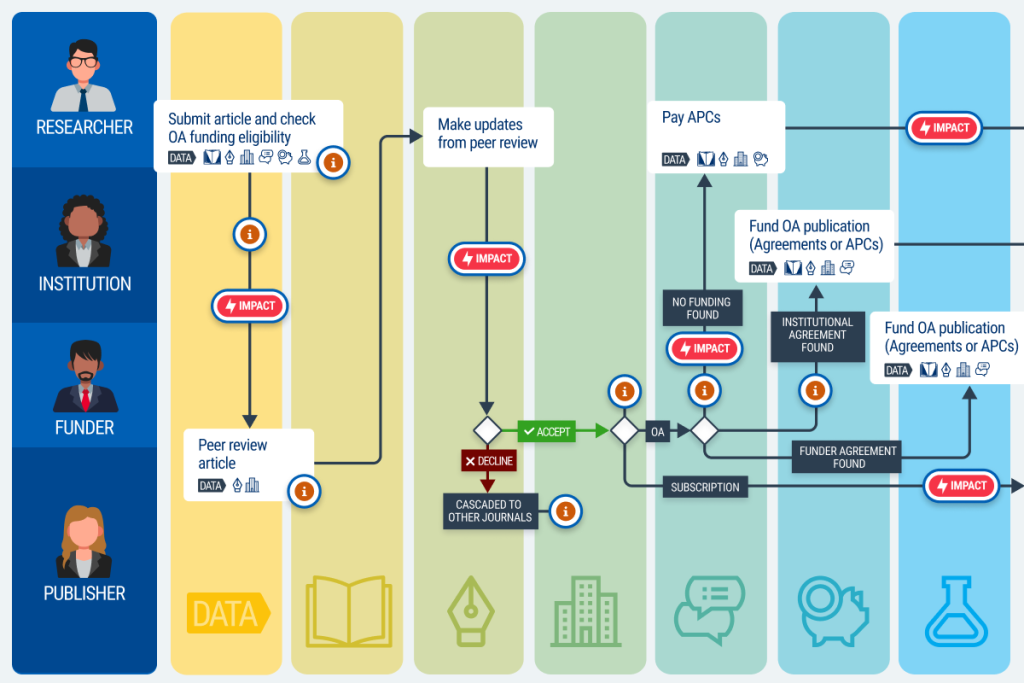
OA Intelligence
How it works
Features
- An easy three-step modeling process to efficiently create agreement offers and streamline communication of data with institutional partners.
- AI-enabled, affiliation enrichment technology and analytic capabilities to reliably identify institution affiliations and funder relationships.
- Ability to import your publication data, regardless of system of record, through a standardized and ESAC-compliant template.
- Dynamic data visualizations and analysis tools to showcase deal transparency and measure success.
Benefits
- Optimize and scale OA programs with efficient tools to model “what-if?” scenarios for agile experimentation and innovation without costly, error-prone processes.
- Reduce time-consuming institution affiliation disambiguation efforts through AI-enabled enrichment technology.
- Gain strategic insights into your OA program with a 360-degree view of historical publication data (both OA and subscription) to quickly identify new deal opportunities.
- Increase institutional customer satisfaction through consistent, data-driven agreement proposals.
Discover more
Why OA Intelligence?
Constructing data-driven publishing agreements at scale impacts all stakeholders in the OA environment. OA Intelligence transforms the agreement modeling process by supporting better visibility and communications to facilitate collaboration with our partners.”

Streamline the creation of your OA Agreements in 3 steps
1. Prepare
Conceptualize your agreement offer with disambiguated publication data, outline its core parameters, and create your historical baseline to model a future deal with a specific partner.
2. Build
Leverage comprehensive pricing parameters to simulate and experiment with new deal types and create agreement offers to propose to institutional partners.
3. Analyze
Analyze, compare and adjust your pricing to meet your goals, partner expectations, market dynamics, and more.
Open Scholarly Publishing Solutions Community Resources
Through partnerships, integrations, and support of cross-stakeholder initiatives, CCC supports OA funding workflows that serve everyone in the community — publishers, institutions, funders, and authors. Learn more >
Featured resources
The State of Scholarly Metadata: 2023 Interactive Report
CCC and industry consulting firm Media Growth Strategies recently undertook a thorough examination of metadata management across the research lifecycle. Drawn from interviews with dozens of industry stakeholders, we created a visual report that depicts the significant economic and social impact that a fragmented metadata supply chain has on researchers, institutions, funders, and publishers on the journey to Open Access and beyond.
Analytics Starts with a Question: How to Better Understand Your Data
As the power of computing and access to information has increased, data, and the knowledge derived from that data, has become an increasingly important driver for organizational decision-making.
Exploring the Challenges in the Shift to Open Access: Part 1 – Data
Data is key to fueling the transition to Open Access publishing models, but it also presents some of the largest challenges. In the first part of a 3-part series, Herman Mentink takes a look at some of the data challenges publishers face in this transition.
How Data Quality Makes or Breaks Open Access Agreements
CCC’s Senior Director, Information & Content Solutions, Jamie Carmichael looks at the importance of data quality in negotiating and implementing open access (OA) institutional agreements.






